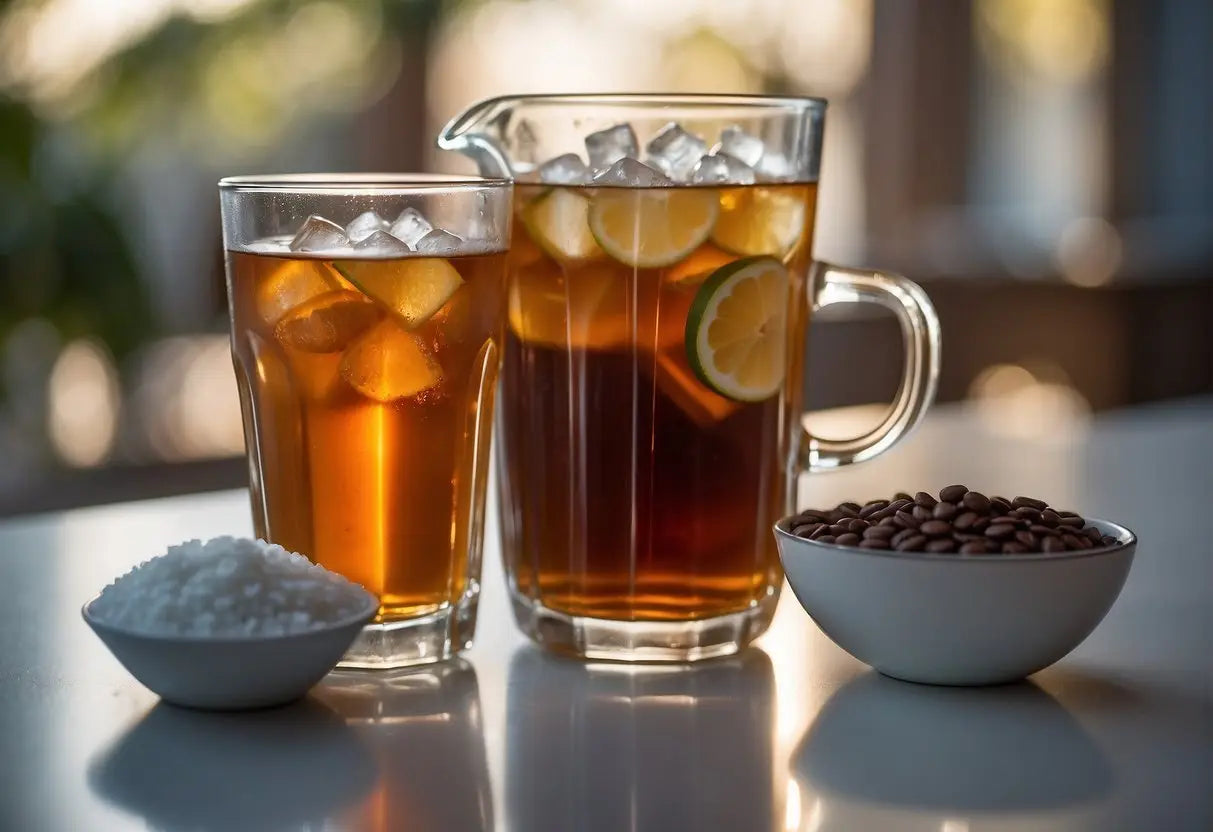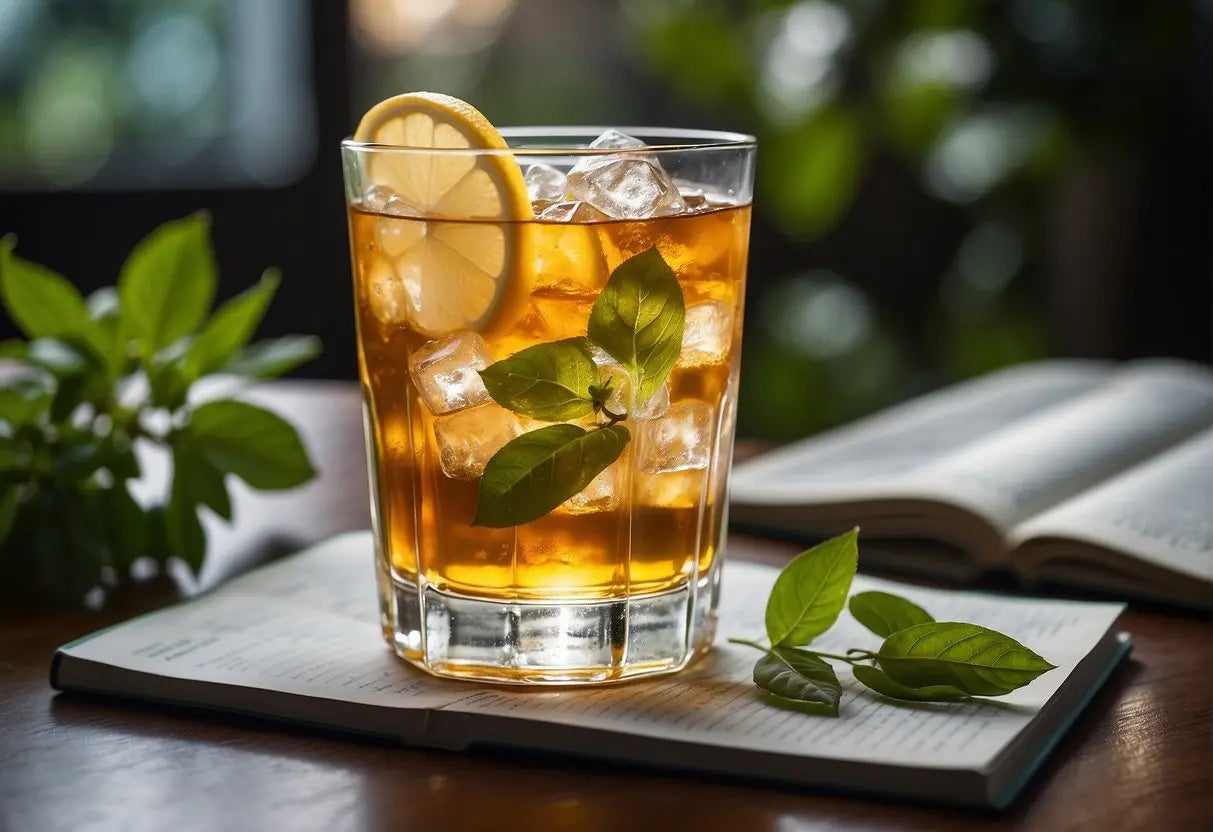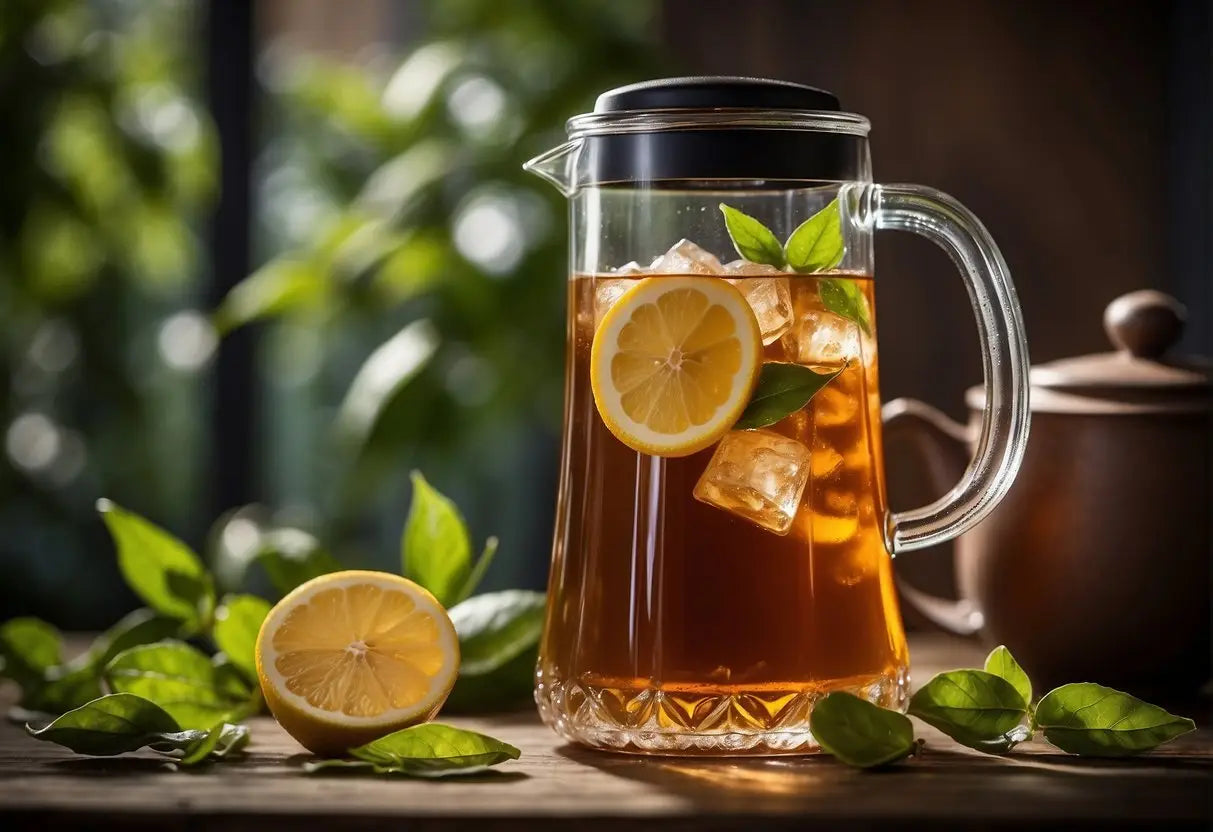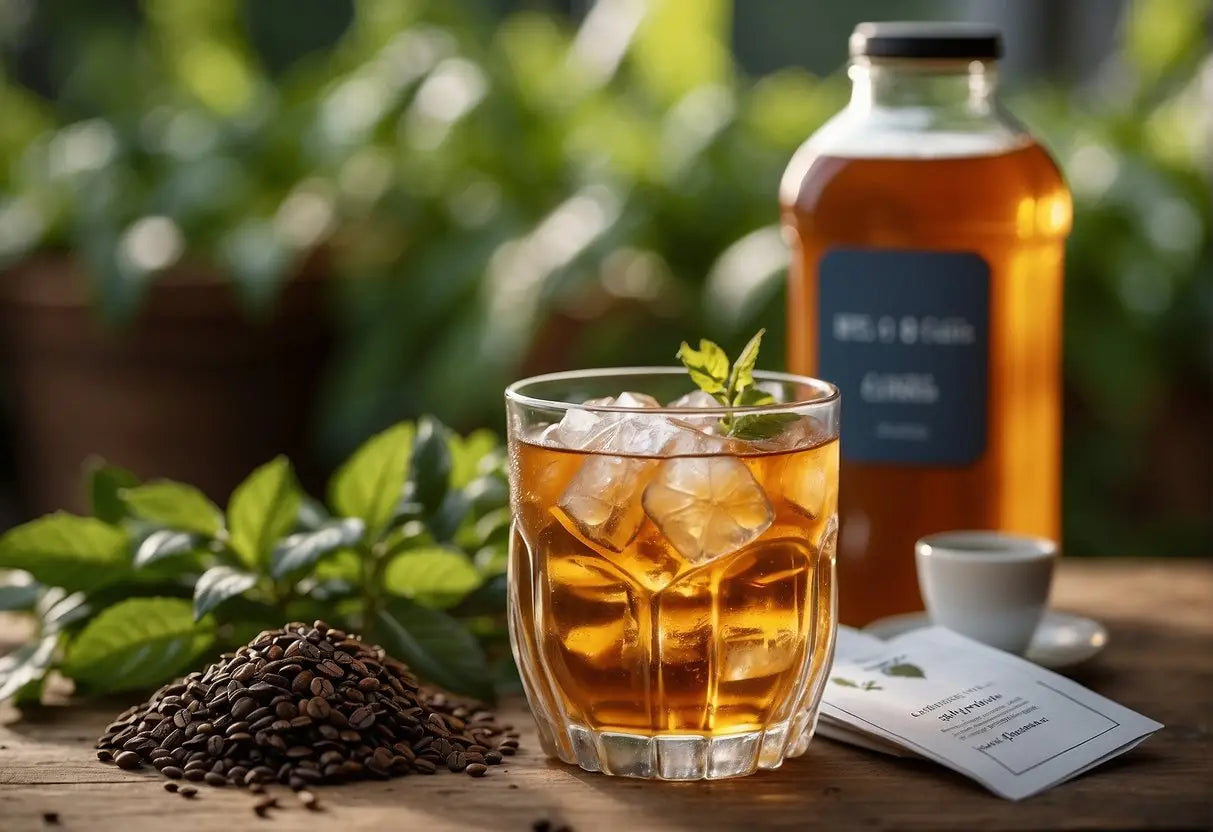How Much Caffeine in Iced Tea
When you're selecting an iced tea, it's important to understand its caffeine content, which can vary widely depending on the type of tea and the preparation method. Black tea iced varieties typically contain more caffeine than those made from green tea.
The following list details approximate caffeine content for a standard 8-ounce (240-milliliter) serving:
- Black iced tea: 25-50 milligrams
- Green iced tea: 15-30 milligrams
Keep in mind, the exact caffeine content can be influenced by:
Bestsellers
- Steeping time: Longer steeping can extract more caffeine.
- Tea leaves vs. tea bags: Loose leaves often result in stronger tea.
- Water temperature: Hotter water generally releases more caffeine.
Label reading is a reliable way to check for caffeine levels as manufacturers often list this information on the packaging. Additionally, if you're sensitive to caffeine or monitoring intake for other reasons, consider the degree of dilution and added ingredients, like syrups or creams, which do not affect caffeine but may impact flavor and calorie content.
Remember, decaffeinated iced teas are also available, typically containing less than 5 milligrams per serving, offering a lower-caffeine alternative while still enjoying the flavor of iced tea.
Factors Affecting Caffeine Levels
Caffeine content in iced tea can vary widely due to several factors. Understanding these can help you choose or prepare a beverage to meet your desired caffeine intake.
Tea Variety
Different types of tea leaves contain varying amounts of caffeine. Black tea typically has the most, ranging from 40-70 mg per 8 oz. serving, while green tea offers a modest amount of 20-45 mg. White tea and oolong fall between these ranges. Herbal teas, usually not true teas, often contain no caffeine at all, unless mixed with caffeinated tea leaves.
Brewing Time
The length of time the tea leaves are steeped in hot water significantly influences caffeine levels. A short brewing time of 1-3 minutes extracts less caffeine, while a longer time, say 3-5 minutes, can potentially double the caffeine content in your tea.
Tea Leaf Quantity
The more tea leaves you use, the higher the caffeine content in your iced tea. A standard guideline is 1-2 teaspoons of loose-leaf tea or one tea bag per 6 to 8 ounces of water.
Serving Size
The size of your drink affects your total caffeine consumption. A standard serving size is 8 ounces. Drinking a 16-ounce size doubles the caffeine, assuming the tea variety, brewing time, and tea leaf quantity remain the same.
Comparison With Other Caffeinated Beverages
When assessing the caffeine content in iced tea, it's instructive to compare it with other popular caffeinated beverages. Generally, an 8-ounce (240-milliliter) serving of iced tea contains between 20 to 50 milligrams of caffeine, but this can vary depending on the tea type and preparation method.
- Coffee: A standard 8-ounce cup of coffee typically has significantly more caffeine, ranging from about 80 to 100 milligrams. However, specialty drinks and larger sizes can contain much more.
- Soda: Caffeinated soft drinks usually offer less caffeine than iced tea, with most sodas containing 20 to 40 milligrams per 12 ounces (355 milliliters).
- Energy Drinks: These can vary widely, but many contain high levels of caffeine—often around 80 to 150 milligrams per 8 ounces.
To visualize this comparison, here's a simplified table:
| Beverage | Volume (oz) | Caffeine Content (mg) |
|---|---|---|
| Iced Tea | 8 | 20-50 |
| Coffee | 8 | 80-100 |
| Soda | 12 | 20-40 |
| Energy Drinks | 8 | 80-150 |
Remember, the actual caffeine content in your iced tea can vary by brand and the strength of the brew. If you are sensitive to caffeine or are monitoring your intake, check the specifics of your chosen product or prepare your tea with less time steeping to reduce caffeine levels.
Understanding Caffeine Measurement

When you're assessing the amount of caffeine in iced tea, knowing the measurement units is essential. Caffeine is typically measured in milligrams (mg). To gauge your consumption, consider that a standard 8-ounce (240-milliliter) serving of iced tea can vary significantly in caffeine content, generally ranging from 15 to 70 mg. The variability depends on several factors, such as the type of tea leaves used and the steeping time.
Lao Ban Zhang
Factors Influencing Caffeine Levels:
- Type of tea leaf (e.g., black, green, white)
- Steeping time
- Water temperature
Here's a brief guide to help you understand the caffeine content in different types of iced tea:
| Type of Iced Tea | Average Caffeine Content (mg per 8 oz) |
|---|---|
| Black Iced Tea | 47 |
| Green Iced Tea | 28 |
| White Iced Tea | 21 |
| Herbal Iced Tea | 0 (Herbal teas are naturally caffeine-free) |
Remember that these values are averages and can vary by brand and brewing method. If you're sensitive to caffeine or monitoring your intake, it's wise to check the specific brand's information or consult with the cafe or restaurant serving the iced tea.
When considering packaged iced tea or specialty drinks from cafes, note that portion sizes may be larger, and consequently, the caffeine content will be higher compared to the standard 8 oz serving. Always verify the serving size to accurately determine the caffeine you're consuming.
Health Implications of Caffeine in Iced Tea

When you consume iced tea, you're ingesting caffeine - a central nervous system stimulant. The caffeine content in iced tea can vary widely, typically between 10 to 70 milligrams per 8-ounce serving. Understanding how this caffeine affects your health is important for making informed dietary choices.
Caffeine influences multiple bodily systems. In moderate amounts, it can increase alertness and reduce fatigue. However, excess caffeine intake can lead to negative effects, such as insomnia, jitters, increased heart rate, and in some cases, anxiety. Your sensitivity to caffeine can be influenced by body weight, tolerance, and genetics.
For specific groups, caution is advised:
- Pregnant women should limit their caffeine intake to less than 200 milligrams per day due to potential impact on fetal development.
- People with heart conditions may need to reduce consumption to prevent palpitations or arrhythmias.
- Individuals with anxiety disorders might find that caffeine exacerbates their symptoms.
To keep your caffeine intake in check, consider the following guidelines:
- Read labels for specific iced tea products to find accurate caffeine content.
- Monitor your servings throughout the day to keep within recommended limits.
- Substitute with decaffeinated versions if necessary to manage intake.
By staying informed and conscious of the caffeine in iced tea, you can enjoy this beverage without overshadowing the benefits with potential health risks.
Decaffeinated Iced Tea Options

When you're looking to enjoy iced tea without the caffeine buzz, you have several decaffeinated options at your disposal. These choices retain the delicious flavor of traditional iced tea while containing minimal amounts of caffeine.
Products and Caffeine Content:
-
Commercially Decaffeinated Iced Tea: Most brands offer decaffeinated versions of their regular iced tea. These typically contain 1-5 milligrams of caffeine per 8-ounce serving.
-
Herbal Iced Tea: Herbal teas like rooibos or chamomile are naturally caffeine-free and can be served cold as a flavorful alternative.
Making Your Own:
-
DIY Decaf: You can decaffeinate regular tea at home to some extent by steeping the tea for 30 seconds, discarding the water, and steeping again with fresh hot water. This method removes some of the caffeine but not all.
-
Cold-Brewing: Choose decaffeinated tea bags or loose-leaf options and steep them in cold water for 6-12 hours in the refrigerator for a smooth, mellow flavor.
Remember, while decaffeinated iced tea options are lower in caffeine, they are not completely caffeine-free. If you are sensitive to caffeine or are avoiding it for health reasons, it's important to check the caffeine content on product labels or inquire about it when ordering at a café.
Popular Decaf Iced Tea Brands:
- Lipton Decaffeinated Iced Tea
- Celestial Seasonings Decaf Green Tea
- Twinings of London Decaffeinated English Breakfast
You can enjoy your iced tea experience without the effects of caffeine by choosing any of these decaffeinated options.
Frequently Asked Questions

Caffeine levels vary in different beverages, and in this section, you'll find precise comparisons between iced tea and other popular caffeinated drinks, as well as information on caffeine-free alternatives.
What is the caffeine content difference between iced tea and regular hot tea?
The caffeine content in iced tea and hot tea prepared from the same type of tea leaves is generally similar. However, brewing methods can affect the caffeine content, with hot tea typically having slightly more caffeine due to longer steeping times.
Can you compare the caffeine levels in iced tea and coffee?
Iced tea usually contains less caffeine than coffee. A typical 8-ounce serving of iced tea has about 15-70 milligrams of caffeine, while a similar serving of coffee might contain 80-200 milligrams.
Is there a significant difference in caffeine content between iced tea and Coke?
Yes, the caffeine content in iced tea is usually higher than that of Coca-Cola. A 12-ounce can of Coke contains about 34 milligrams of caffeine, whereas the same amount of iced tea can have 15-70 milligrams, depending on the brand and brew.
Are there any caffeine-free iced tea options available?
Yes, caffeine-free iced tea options are widely available. These are specially crafted using decaffeinated tea leaves or herbal teas that naturally contain no caffeine.
What is the typical caffeine amount in a bottle of Nestea iced tea?
A 16.9-ounce bottle of Nestea iced tea contains about 25 milligrams of caffeine, which is modest compared to other caffeinated beverages.
How does the caffeine content in unsweetened iced tea compare to that in coffee?
Unsweetened iced tea typically has less caffeine than coffee. An 8-ounce serving of unsweetened iced tea can have between 15 to 70 milligrams of caffeine, whilst the same size serving of brewed coffee has about 80-200 milligrams.
← Older post Newer post →











